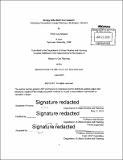Energy & the built environment : assessing renewable energy planning in Burlington, Vermont
Author(s)
Lay-Sleeper, Ethan
DownloadFull printable version (9.524Mb)
Alternative title
Energy and the built environment : assessing renewable energy planning in Burlington, Vermont
Other Contributors
Massachusetts Institute of Technology. Department of Urban Studies and Planning.
Advisor
Alan Berger.
Terms of use
Metadata
Show full item recordAbstract
Society's dependence on fossil fuels, spawned during the industrial revolution of the 19th century, increased the physical isolation between the sites of energy consumption, and sites of energy production. Rapid population growth and urbanization following this period gave rise, in the 20 th century, to concerns around the impact of humans on the environment. These concerns precipitated an increased focus on renewable energy, and sustainable development models present in contemporary urban planning discourse. Despite the increased focus on urban sustainability, the rapid expansion of renewable energy capacity and supporting policies, municipal governments in the United States continue to struggle with incorporating renewable energy systems into the built environment. The primary challenges concerning this integration rest in the capacity of municipal government to reinterpret the built environment as a framework for renewable energy, to conduct spatial analysis of the potential capacity in the built environment, and to synthesize that analysis with municipal policies in order to develop more robust and specific targets for renewable energy development. In response to these challenges, I assess opportunities and barriers for renewable energy development in the built environment, and synthesize established methods of spatial analysis, renewable energy policy, and project development models, to inform the role of municipal government in future planning efforts around renewable energy. To investigate the potential practical applications of this research, I focus on the city of Burlington, Vermont, which in 2014, earned the status as the first city in the United States to source 100% of its electricity from renewable sources. I question the replicability of the means by which Burlington attained this status, whether further opportunities exist for Burlington to expand its support for renewable energy, and what role the municipal government might assume in this expansion. I find the means by which Burlington sources its renewable energy only partially replicable, but I also find significant opportunities for Burlington to expand support for renewable energy within its municipal boundaries. I conclude my research by providing my findings to the city, in hopes that they will strengthen the role of municipal government in renewable energy planning.
Description
Thesis: M.C.P., Massachusetts Institute of Technology, Department of Urban Studies and Planning, 2015. Cataloged from PDF version of thesis. Includes bibliographical references (pages 83-88).
Date issued
2015Department
Massachusetts Institute of Technology. Department of Urban Studies and PlanningPublisher
Massachusetts Institute of Technology
Keywords
Urban Studies and Planning.